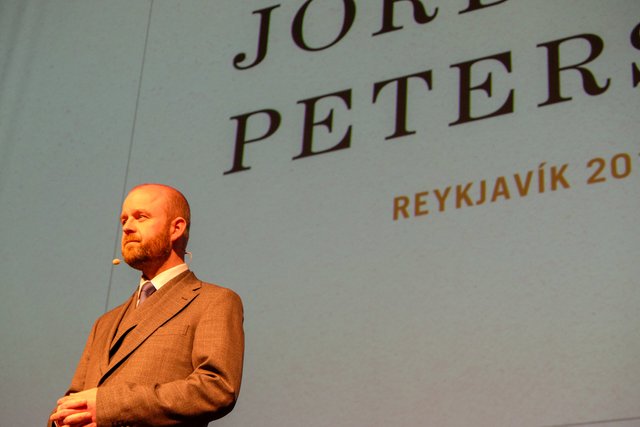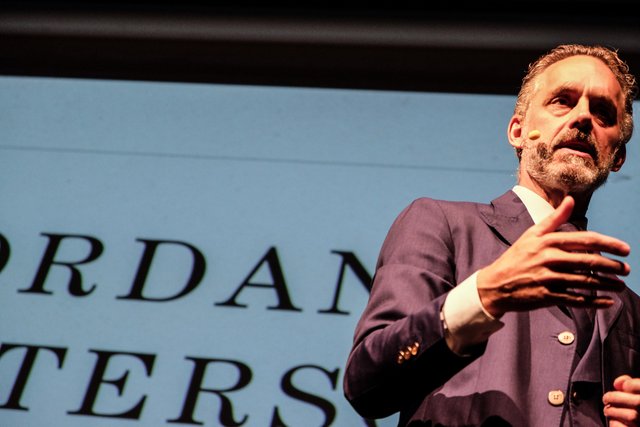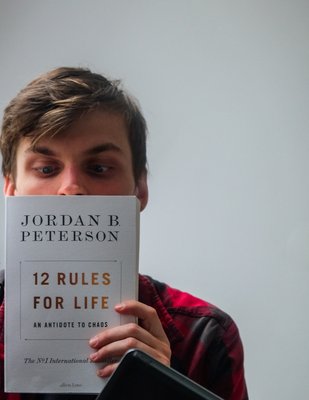Perceptions of Jordan Peterson. Reflections after the lecture in Iceland
April of this year. The very first few weeks of my time in Iceland. A lot of new challenges, such as looking for a job, trying to get to know the reality of the new state, looking for housing, facing Icelandic prices and... many more. While surfing some corner of the Internet related to Jordan Peterson, the word "Iceland" passed somewhere in front of my eyes. My heart skipped a beat! Not more than a few seconds later I discovered that two of his lectures scheduled for June and will have place in Reykjavík!

The event was to take place in the most prestigious event venue in Iceland, Harpa, which you can see above. The number of tickets for the first lecture has been completely sold out, but on the second day there were still some free seats left. The tickets were not cheap for someone who is just starting work in Iceland, but still I decided to go to a meeting with Peterson dated June 5th. This event made me reflect a lot about Jordan Peterson, his relation to science, how supporters and opponents perceive him, and my own attitude to this person. I would like to verbalize these reflections somehow, at least to structure a bit my thoughts

I am not going to portray Jordan Peterson in a specific way, as most of the articles around do. Everything has already been written about this Canadian psychologist - that he is the most important living intellectual, racist, philosopher, sexist, brilliant psychologist, pseudo-scientist, left-wing devastator, right-wing extremist, Occident defender, maniac, agnostic, Christian apologist, manipulator, coach, messiah, compassionate archetype father or a dangerous, aggressive figure. Which of these terms better reflect reality - I leave you to judge. Hundreds of videos with Jordan Peterson can be found on the Internet, and I don't want it to be another text that tries to tell the reader who he this polarizing the whole world Canadian professor is.

Two Stories About Psychology
I first came across Jordan Peterson in spring 2017. At that time I worked intensively on my Master's thesis1, about which I have to elaborate a little bit for the context. My thesis was quite untypical because it was a theoretical one, while the majority of Master's thesis in psychology is empirical, preceded by research conducted and designed by the students. I took an entirely different path. I had some experience in empirical psychological research, but I wanted to go deeper into a topic that has been bothering me since the beginning of my studies and which is at the same time a scientific and intellectual dispute, or rather a discussion that has been reviving in different ways since the very beginning of psychology as science2. It is a dichotomy of the qualitative approach (individual, personal, focusing on what distinguishes man and his subjective experiences, trying to describe him thoroughly, but not quantitatively) and quantitative (quantifiable, trying to capture human psychology in numbers and statistics and general theorems that strive to have high accuracy in terms of empirical evidence). Both of these foundations derive from different philosophical and scientific traditions. Most psychologists simply "advocate" one of them more or less, some openly deny the rationale and value of one of them, others try to reconcile them and use various approaches, or at least respect the other approaches to psychology. Contemporary scientific academic psychology is definitely dominated by empirical psychology based on quantitative methods, which does not mean that qualitative methods are not used and developed. nowadays. My master's thesis concerned analytical psychology, whose initiator was Carl Gustav Jung, in the context of mainstream modern empirical psychology.

Even before I became a psychology student, I was fascinated by the figure of Carl Gustav Jung. His psychology definitely represented a qualitative approach. Thus, at the beginning of my studies, with a dose of doubt and reductionism on my lips I approached all digits and graphs trying to frame the phenomenon of the human psyche. I did not like the idea you can grasp such a complicated phenomena in such a "dry and cold" way. Over time, however, having become familiar with how tests are constructed, how empirical research is conducted and verified, with what caution psychologists put and verify hypotheses, and how much they are aware of the difficulties in connection with what their object of research is (invisible, immeasurable, difficult to grasp psyche) I became respectful to statistical methods and developed greater dose of scepticism and rationalism. But the fascination with the figure of Jung and this "second" kind of psychology did not evaporate. I concluded that both ways are valuable in their own way and can expand our knowledge about man, despite their own limitations.

This thesis was therefore an attempt to confront two worlds that were not entirely philosophically and scientifically compatible with each other - the world of Jung's psychology, which approaches statistical research with scepticism, and which according to modern standards in psychology does not meet the conditions to be called science, with the world of this mainstream, neo-positivistic psychology, which tries to develop a rigorous methodology and strict definitions. My work consisted in searching for traces of Jung's concepts such as archetypes or complexes in other, nowadays recognized theories with empirical background, but also in searching for and presenting a few empirical studies directly verifying Jung's hypotheses.

And here we return to Peterson. For the first time, I came across him by chance while watching one of several videos presenting his disputes during student protests related to the confusion over the introduction of the controversial C-16act in Canada. I curiously visited Jordan's YouTube profile and quickly realized that the political content is a drop in the ocean of what can be found there. In fact, it was the least interesting drop. I started to discover these fascinating lectures on personality psychology, psychological interpretations of biblical stories, a lot of religious psychology, "45 minutes on a single paragraph of Nietzsche's", or a whole series on how people construct meaning, which is discussed in the context of 20th century totalitarianism (among others).

What shocked most of all though, was that Jordan freely and rationally connects Jung with modern empirical psychology, statistics, Big Five personality theory, cognitive science and evolutionary psychology. In his lectures and books he does something very similar that I tried to do in my thesis - he clashes two seemingly incompatible worlds, which speak the same, but with a completely different language and with different methods. It was a shock to me especially because there are VERY few Jungian oriented psychologists interested in empirical research (I have the impression that I mentioned all the existing ones in my master). Among modern analytical (Jungian) psychologists, the qualitative pole still dominates very prominently, and the quantitative approach, or even the attempt to bite the Jungian constructs from the side of cognitive science, is rather avant-garde, sometimes even perceived as inappropriate. Analytical psychology tends to "stick together", more likely to "romance" with anthropologists, religious studies scholars or other social sciences than with academic psychology. Jordan Peterson is, however, a true exception. Moreover, he is a psychologist and therapist trained in behavioural-cognitive psychotherapy. A Jungian trained in the behavioural-cognitive paradigm, using qualitative methods, but at the same time being a fervent advocate of empirical psychology is a very rare specimen!
Jung Reincarnated
Jordan Peterson is often accused of being unscientific, thereby throwing him into a large bag of pseudoscience. This is usually backed up by some questionable statement or hypothesis put forth by Peterson during one of his lectures or media appearances. Nonetheless, I have an irresistible impression that both Peterson's defenders and his fierce opponents judge his competences too hastily and easily. As I mentioned above, Peterson is not an average academic psychologist. He combines social psychology, psychology of personality and human development with cognitive and biological sciences and a qualitative tradition of analytical psychology. Such an eclectic approach is quite rare and thus it is very difficult for psychologists and academics to assess unequivocally. The problem is not entirely new and actually concerns Carl Gustav Jung himself3. In my opinion, this problem has arisen around Peterson precisely because he takes a handful of Jung's views of the world and the Jung's way of thinking is simply slightly different from the model of science that has "won" in the development of psychology. I'd say that 70% of what Peterson says is simply analytical psychology in a slightly newer, updated edition, supported by other widely recognized theories such as the Big Five theory, Jean Piaget's discoveries or Jaak Panksepp's "affective neuroscience". Peterson has probably done more to promote the idea of Jung than all his successors put together! After all he's on the most famous psychologist in the world at the moment!

Unlike Jung, Jordan Peterson is much more extraverted, likes cameras, enjoys contact with the audience and is on fire with an attractive charisma both on stage and in media appearances. He is well acquainted with the scientifically recognized part of psychology and he skillfully smuggles into these realities the concept of archetypes and other Jungian concepts. So is he pseudoscientific? I am by no means an authority in this field, but I believe that the answer is extremely complex. Apart from the highly rigorous empirical research and diagnostic tools, of which Peterson is a co-author and which have been published in numerous scientific journals, the value of which is also hard to question, Peterson in his rhetoric uses a rather controversial inductive combination of distant facts, distant theories, and quite freely and intuitively links certain relationships between psyche, culture, religion and politics. He does it in exactly the same way as Jung did in his time. This type of methodology is nowadays not considered too valuable in academic psychology. However, this has not always been the case and it does not mean that this type of intellectual work is inherently unscientific. Surely it has completely different philosophical roots, reaching back to other scientific traditions derived from German empiricism and phenomenology (such as Alexander von Humboldt or Goethe's scientific work)4.

If you immerse yourself a little deeper in the subject of philosophy of science, it may suddenly turn out that part of what Jung or Peterson may qualify as science, but in a broader sense than the current ones, another part of their theories may not qualify at all, and yet another may meet all the standards set by today's academic psychology! So I don't think the answer is straightforward, and just as I couldn't answer the problem of Jung's science in my thesis with full confidence, I don't intend to give an unambiguous opinion about Peterson here. To answer this question one should define well what science is and what it is in the context of psychology, because both Jung and Peterson seem to represent certain boundary cases of this problematic. It is worth emphasizing here that Peterson puts these speculative, hardly verifiable hypotheses aside from publications and strictly scientific conferences. He is aware of a certain duality and incomplete compatibility of his scientific views (it's worth notion that the fact that lack of compatibility does not necessarily mean that he contradicts himself!).

Peterson & Guts
The above-mentioned thoughts accompanied me throughout the whole period of writing my master's thesis, as well as while discovering what Peterson has to say and how he supports that. I have also noticed something else, this time observing myself and my reactions to the whole event. In the end, it was a meeting of someone who (after all) inspired me strongly during the last year of my life. I guess I've been cheating myself a little bit so far that Peterson is for me only an intellectual "nutrient". Going to this event I didn't consider it much "bigger" than going to a scientific conference or a university lecture. But it's hard to keep such a thought, noticing a huge excitement, or even distress, in a word - a rather strong emotional affection. So I began to ask myself to what extent is Peterson a scientist for me, and to what extent is he a celebrity, authority or "academic super star"? I eventually concluded that he is a bit of everything I mentioned and that I can let myself be a "fanboy" even at this age :)

I am aware of Peterson's faults, that some of his hypotheses should be approached with caution and scepticism, especially those outside the field of psychology. I think that the self-awareness of "charm" that a character evokes in us allows us to distance ourselves from this charm and even to let us enjoy it in a more controllable sense. Fortunately, Peterson more and more often tries to emphasize what is pure speculation in his arguments, and what is solid empirical data. I suspect that for him, just like for me, these issues Iaid down above are not trivial and probably he experiments with the way in which he should conduct them. Peterson himself encourages us to take a critical look at his achievements and words, which is very important because, unfortunately, the cult that surrounds him is not always a healthy one, and many people seem to miss his message (especially the so-called "alt-right").

And the lecture itself? It was great, as always. Quite casual, full of digression, but still a meaningful journey through themes that always meet somewhere at a certain point. Themes were varied - individualism and collectivism, how to create meaning in a world filled with suffering, archetypal stories repeated throughout cultures. I didn't actually hear anything there that couldn't be found from his other lectures that land on his channel, or from a book that this lecture is a promotion of. These are by no means simple things, so assimilating them several times does not deplete their value at all, but each time it helps to assimilate some new observation or idea. It was also worth going to confront not who Jordan Peterson is objectively, but who he is for me personally.

After the lecture, I managed to shake his hand, exchange a few words and get an autograph. I handed Jordan literature from my thesis, considering that maybe it could be somehow useful for him in discovering some research or concepts which he did not know, but which are in his area of interest. I guess it would be a nice change for him, as he's rather used to receive letters of gratitude ;)

P.S. Clean your room!
Literature
1. O'Donohue, W., & Kitchener, R. F. (Eds.). (1996). The philosophy of psychology. Sage.
2. Szwedo, J. (2017). Współczesne próby weryfikacji empirycznej i reinterpretacji wybranych konstruktów teoretycznych psychologii analitycznej.
3. Jones, R. A. (Ed.). (2013). Jung and the Question of Science. Routledge.
4. Saban, M. (2013). Science friction: Jung, Goethe and scientific objectivity. In Jung and the Question of Science (pp. 38-57). Routledge.

SteemSTEM is a community driven project which seeks to promote well written/informative Science Technology Engineering and Mathematics postings on Steemit. More information can be found on the @steemstem blog. For discussions about science related topics or about the SteemSTEM project join us on steemSTEM Discord server and check out new SteemSTEM site - www.steemstem.io.
He is a charlatan that doesn't even understand what post-modernism is, despite his attempts to 'attack' it.
I do agree that his criticism of post-modernism is at least reductive and probably just wrong. I do not agree that that crosses out all he says or does.
I would have proposed to him! 😏
This is an incredible post @saunter! Thank you for sharing this experience with us :)
12 Rules for Life is a good book. As for Maps of meaning ... magnificent, but ... well, still chewing on that one! Other than that, I have also come across some of his works on Agression in Children, which I cited in a post I wrote a few months back.
I know that he is equally liked and disliked, and I by no means agree with everything he says. Still, I think he is great for psychology as a whole. Despite of how scientific other academics regard him to be, it is great that it is Peterson that is inviting people to the world of psychology through his vast knowledge and charisma.
I hope he reads your thesis :D
Reesteemed!
I think when one, like Peterson, speaks with rational thought, open mindedness, and critical unemotional evaluation of the human animal and it's attempts at finding it's own definition, this ruffles feathers. I and @winstonalden have listened to many of his talks and he seems to speak mostly common sense and rational thought. I think the human animal is a creature of habit and herd and when they are told , as a group, to think one way it is hard for them to hear differing views. Even when the view is to 'self evaluate and use logic to discern your own reality'.
I think we probably agree on him. Such things can be polarizing so I tend to not speak about t, but then again, in our current climate I monitor most of my thoughts, as one is never sure who is the 'thought police'. We do live somewhat in a dystopian future sci fi novel it seems sometimes :)
That is the thing isn't Donna :) what we think it's critical unemotional evaluation, others think it's prejudice. Also, you have raised an incredibly valuable point here, that of 'the human animal being a creature of habit and herd'. One of the arguments Social Identity Theory puts forwards is :
Well, this is what grants someone their 'group membership', after all. But still, that doesn't stop the fact that the individual exists in a continuum which in one extreme is the personal identity, and in the other is the social identity. Neither of which should be neglected in the process of decision making, but rather equally consulted.
Yes, we live in interesting times. Times in which the minorities not only gained their deserved opportunity of being heard, but also the position to intimidate legitimate discussions. So, I better stop here, I don't want to be sent to room 101 ;)
The irony of the human condition too, is that it is always trying to find itself in the collective and yet in reality it is an isolated creature in a void of it's own perception.
Perhaps the fear of reality and the true solitary is too much for the general human capacity to face, so they turn away from their truth in themselves and embrace the shadows of the collective which only exists in their belief in it.
Sorry, rambling .I better have another cuppa and focus on painting and keep philosophizing to better minds :)
Your rambles are very welcome :)
Happy painting!
Oh I was super wondering what's your opinion on him, since he's, you know... really controversial. I don't agree with everything he says too, and I am well aware of some of his contradictions and simplifying things. But sometimes I get an impression that his critics demand him to be perfect and are just waiting on something to jump on and point that he's wrong here and that. Come on, he's also a human being.
My thesis is in polish so I don't think he'll read it :D I gave him just my literature with some most interesting research highlighted.
Thanks Abi for your comment and resteem <3
Hi @abigail-dantes. If you respect him he will certainly get a longer look from me. So far, I have read not much about him that is positive--but it's only been five minutes :) I did check out the post you referred to about aggression in children. His view on this certainly seems reasonable--not an extreme view at all.
In any event, I'm curious now and will have to look further. There's no excuse for ignorance about a personality with such popular thunder.
I'm looking forward to your blog on Friday!
Hello my dear 😊 It is always nice to hear from you :)
But first, let me thank you for having a look at that post.
As for Jordan Peterson ... I happen to know more his work, than what has been said about him out there. I like very much how he integrates the social world, biology, history and even religion to psychology. And similarly to Saunter here, I identify with this sort of approach very much, as I believe that as individuals we can draw lessons from each and all of those contexts. Is that scientific? No. Do academics like that? No. But then again, it is not them he is addressing through his social media, talks across the globe and self-help book (on the contrary, his papers on child development are the result of rigorous research and scientific methods).
So, that leaves us with the general public. Now, we live in great times where people can manifest their true selves and voice their heartfelt opinions. What an achievement for the minorities! However, for them (the minorities) to get here much suffering took place. And perhaps, because of people who 'look like' Peterson. Consequently, there is very little tolerance towards anything that is not in accordance with them, especially when it comes from those who 'look like' Peterson!
For example, Peterson is an advocate of the inherit biological differences between men and women. Feminists and other women alike perceive this as him putting us down. But, really, what he never said, as far as I know, is that being different put us automatically in a better vs. worse position. The past tells us that. Not Peterson. Indeed, he says women should have children, that they shouldn't wear make up in the work environment, and gives his reasons for that. For me, those are nothing more than his personal opinions; which, whilst I find outrageous I respect because they are honest.
And, I think that is our problem, overall. We only like 'honest' when it coincides with what we think. When someone like Peterson exposes himself the way he has done and finds himself having to answer questions that touch on incredibly sensitive topics ... well, he is bound to offend people. Then, the division sets in. I have personally felt offended by some of his opinions. Still, I have learnt to look at people from a wider lens, and I also respect individuals who take responsibility for what they say. I think Peterson does that quite well.
Oh! You see... you make me 'talk' my dear :) And, I am not really a talker!
Anyways ... here is a Monday kiss for you 😘
As always, you are a delight. Please do talk. I'm not much of a talker, either, but I do appreciate individualism and I think labels can be a kind of tyranny. They don't allow for subtlety or nuance, which truly characterize thought and human interaction. I remember being mortified when I read about Goethe's personal life--because I thought it did not reflect well on him. But his work is still brilliant, and valuable. The same with Robert Frost. He was apparently a cruel husband--but a prolific and effective poet. So...life is not yes or no. There are, of course, some views and behaviors that would invalidate someone's opinions for me. I don't expect to find that in Peterson. But I will let you know. Thanks for the 'conversation' :)
Keep your hands of him, he is mine !
Oh! I see ... 😏
This post has been rated by the user-run curation platform CI! In this platform users are able to manually curate content. This is done regardless of Steem Power, for both rewards and vote size calculation.
Join in at our site here!
https://collectiveintelligence.red/
Or join us on discord to interact with the community!
https://discord.gg/sx6dYxt
This post was submitted for curation by: @gentleshaid
This post was given a rating of: -0.995750173308716
This post was voted: 0%
Such a well written article.
I started listening to Jordan a while back because of “clean your room” phenomena that took the internet by storm, I had my encounters with drugs and addictions but the funny part was when I came back home from the hospital the first thing I did was clean my room and start organizing everything together, working out, reading, etc.
Anyways, looking forward to your future articles!
Cheers!
Posted using Partiko iOS
That's a hell of a story! Cleaning your room is really a good start and I still can't believe how brilliant this phrase is in it's simplicity.
Quite a cool article, partly because of its literal close proximity to the very subject it's treating.
Speaking of whom, I can't comment much, because I see Peterson the way I think he ought to be seen: as a person from whom I take what's useful and discard the rest.
Nice to see oral presentations from distinguished lecturers get covered on SteemSTEM!
Nice introductory post to Jung and Peterson.
I love Peterson's lectures so I am extremely jealous that you had the opportunity to see him. Hopefully, he will travel to a city near me in his next tour.
Posted using Partiko Android
Where do you live? He'll be touring Europe in 2019. Thanks for your kind words
Honestly: I thought higher of him before reading 12 Rules for Life.
The vast amount of religious gibberish started to annoy me quite fast. I'm probably quite biased regarding that, but someone who claims to be some kind of empirical intellectual shouldn't have the need to promote ancient fairy tales. This is what I would call intellectual dishonesty, because he's not out there looking for truth and reason but some metaphysical bullshit coated as psychology.
There's already enough of that nonsense out there.
that about sums up my opinion on him
I'm still surprised this intellectual hack has achieved such recognition and fame. Really speaks to how lacking our education systems are I suppose.
Compared to who?
Compared to no one in particular, just saying he's made a name for himself. Has a legion of fans, has gone on the major TV channels in multiple countries, is a main speaker at events, etc.
So.....
I'm still surprised this intellectual hack, (who is compared to one one else,) has achieved such recognition....
If it's not comparing to others, then that makes him the only one - no wonder he's so successful!
lol
What in your opinion makes him an ‘intellectual hack’? I need some depth & robustness to such a statement...
Just listening to him talking for 5 minutes you notice all the hallmarks: word salads, use of long winded sentences with big words to say simple things, lack of self consistency, fallacious arguments, etc.
Among his highlights: the claim that good atheists don't exist because if you are good then you must be Christian by definition, his belief that there's no such thing as objective truth (all the while decrying postmodernists lol), his claim that ancient depictions of snakes mean the ancients knew about the DNA double helix (a personal favorite!), that prohibiting children from throwing snowballs in the school context is a cultural affront to masculinity and male development, attaching bad things a "feminine" value and good things a "masculine" value, etc, etc. It would be funny if not for his relatively large cultural influence.
Understood. We have to remember that knowledge is provisional. If you remain consistent, your growth may be questionable.
The reason why I like the guy is because his dialogue allows us to question our deep beliefs and then question them as such, while being scrutinized by another person/perspective. It gives us the ability to actually argue our reasonings and deep intuitions.
Although I don't agree with everything he says, I do appreciate his thoughts and novel approaches. Thanks for entertaining my question :)
Yes, our understanding is provisional and subject to change, but if we reject the notion of objective reality then we reject the notion of knowledge, provisional or not.
May I ask what "thoughts" or "novel approaches" of his do you appreciate? Because talking to a flat Earther can also allow us to "question our deep beliefs" but I don't think that's needed to achieve that same goal, and it can even be counterproductive. And giving people who are intellectually dishonest and/or willfully ignorant a platform and treating them like their worldview is worth considering is an affront to the human condition and perpetuates not only stupid ideas but scientific illiteracy (ie. perpetuates not only erroneous facts but more importantly perpetuates a complete disregard for all the tools we have for properly analysing, interpreting and assessing the worth of any data).
I have a different approach to "giving people who are intellectually dishonest and/or willfully ignorant a platform"...I tend to think that you have to give them an opportunity to speak or have a platform, in order for you to destroy it :)
I appreciate some of the following:
The reason I appreciate some of the things I disagree with is because I find them to be valid arguments. Even though we are no closer to finding "truth".